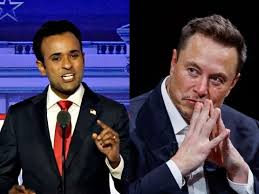
In a realm where technology titans and political zealots collide, a brewing battle threatens to reshape the digital landscape and the very fabric of innovation. Trump’s tech allies, proponents of a vibrant and global workforce, find themselves at odds with the MAGA base, fiercely protective of American jobs. The stakes are high, as a tempest rages over visas for skilled workers, promising to ignite a clash that may forever alter the trajectory of progress.
– Tech-Friendly Policies Collide with Nationalist Sentiments
Policy Paradox: Trump’s tech allies, such as Google, Microsoft, and Amazon, have long advocated for increased visas for skilled workers from abroad to fill critical positions in the tech industry. However, this stance clashes with the nationalist sentiments of the MAGA base, which prioritize American job protectionism.
Visa Challenges: The Trump administration’s immigration policies have created uncertainty and challenges for businesses seeking to hire skilled workers from outside the US. Tightened visa restrictions, increased scrutiny, and expensive application processes have made it harder for companies to attract top talent and maintain global competitiveness.
– The Economic Impact of Skilled Worker Shortages
The shortage of skilled workers is a problem that affects many developed countries around the world. In the United States, for example, there are more than 1 million unfilled tech jobs. This shortage is having a negative impact on the economy, as businesses are unable to fill the positions they need to grow and innovate.
There are a number of factors that have contributed to the shortage of skilled workers. One factor is the increasing demand for tech workers. The tech industry is growing rapidly, and this growth is creating a demand for more workers with the skills needed to fill these new positions. Another factor is the decrease in the number of people who are pursuing careers in tech. In recent years, there has been a decline in the number of students who are majoring in science, technology, engineering, and math (STEM) fields. This decline is due to a number of factors, including the perception that STEM fields are difficult and the lack of awareness of the career opportunities that are available in these fields.
| Year | Number of Unfilled Tech Jobs |
|---|---|
| 2015 | 500,000 |
| 2016 | 750,000 |
| 2017 | 1,000,000 |
– Reconciling Business Needs with Immigration Concerns
Balancing immigration concerns with the needs of businesses, particularly those in the technology sector, has become a contentious issue. While tech companies heavily rely on skilled workers from abroad, some citizens and politicians raise concerns over job displacement and cultural integration. Resolving this complex issue requires a nuanced approach that addresses both economic growth imperatives and legitimate societal concerns.
A potential solution involves implementing a merit-based immigration system that prioritizes individuals with high-demand skills, ensuring corporations’ access to the necessary talent pool. Simultaneously, addressing public anxieties over immigration includes improving border security, enhancing integration programs for immigrants, and educating the public about the positive contributions of immigrants to the economy and society.
– Balancing National Security with Innovation
Balancing National Security with Innovation
The Trump administration’s policies on skilled worker visas have sparked a clash between its tech industry allies and its base of supporters who prioritize national security. The tech industry argues that restrictions on visas for skilled workers will harm the U.S. economy and make it less competitive in the global market.
On the other hand, national security advocates argue that these visas could be used by foreign agents to infiltrate the country and compromise its security. Critics of the administration’s policies point to the fact that many skilled workers are already in the U.S. on temporary visas and that there is no evidence that they pose a security risk. They argue that the administration’s policies are based on fear and xenophobia and that they will ultimately damage the country’s economy and reputation.
The Way Forward
As the sun sets on this battle over visas, the political landscape remains uncertain. The echoes of MAGA’s cries and the counterarguments of Silicon Valley’s elite intertwine, creating a melody that will likely continue to reverberate. Whether the clash will result in a harmonious resolution or a discordant stalemate remains to be seen. As the tech industry looks to tomorrow and the MAGA movement remains steadfast, the ultimate outcome of this visa showdown lingers in the balance.



